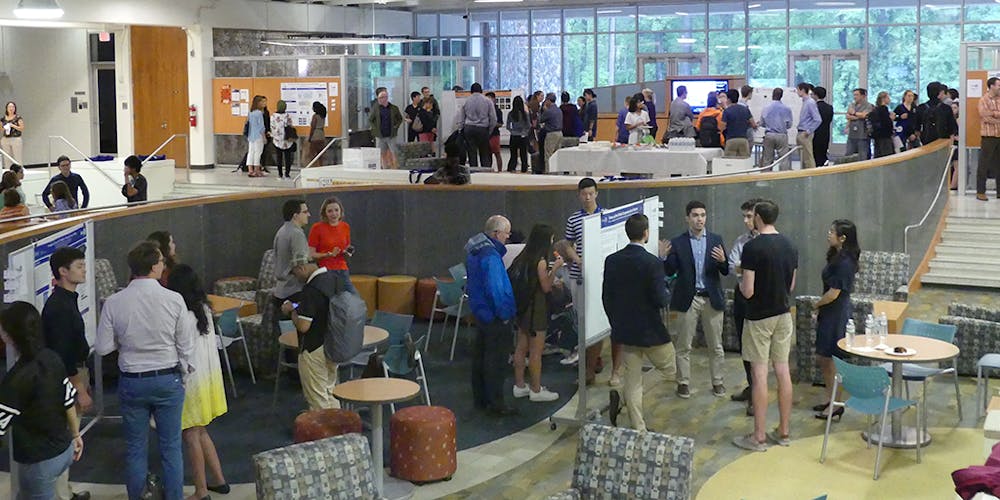From food insecurity to virtualized museum collections to gerrymandering and voting patterns, this summer’s Data+ lineup spans a diverse range of 23 projects. In this 10-week summer program, students have been conducting data-driven research in small teams led by professors and graduate students.
Data+ is typically hosted in person, with a dedicated workspace on campus in Gross Hall. The program has run virtually both this year and last year, but even virtually, Data+ projects are seeking to make a social impact.
One project this year, From Farm to Fork, delivers fresh produce to over 350 food-insecure patients of Duke University Health System and Lincoln Community Health Center and their families biweekly.
“Many of [our patients] have diet-related chronic diseases like diabetes, heart and kidney disease and would benefit from improved access to fresh fruits and vegetables,” said Willis Wong, project lead and fourth-year MD/MBA candidate at the School of Medicine.
The produce is packed in a central warehouse and student volunteers drive the food to patients’ houses every other Saturday. Because of looser COVID-19 restrictions this summer, some students have been able to experience these in-person aspects of their research.
“We’re hoping they can continue to come out and engage with our team this way,” Wong said.
The team chose one particular area to focus on: sustainability. They’re researching the environmental impacts of the food delivery service and looking for data-driven ways to reduce their carbon footprint.
“This [research] includes an evaluation of our food-sourcing management and looking for opportunities to minimize food waste, such as composting,” Wong said.
Another team is working on a project titled Redistricting School Zones in Durham County. Students are reimagining school districts based on population data in the county, which is looking to redistrict in the fall.
Originally, the project explored racial disparities in the child welfare system, but the team had to pivot their focus after facing limited access to sensitive data, according to sophomore Kassie Hamilton.
“This project still has a lot of the same elements as the old one, such as working with data involving children and race,” Hamilton said. “We hope to include data on race, walkability and income in our final productions of districts.”
Hamilton said that in the meantime, the team is focused on “using population data to create districts that separate the schools.”
Examining both Durham and Duke, the Mental Health and the Justice System in Durham County project is focused on the experiences of incarcerated individuals in Durham County who also encounter the Duke Health System.
“We have administrative data from both sources that has been matched at the person-level,” project lead and first-year graduate student Ruth Wygle wrote in an email. “While the original focus of the project (now in Year 5!) was to focus on individuals from this population living with a mental health diagnosis, we've really expanded beyond that now and are looking at numerous health conditions and outcomes.”
The students on this team are busy cleaning newly-obtained data from the past two years. The tea hopes to have the data in good shape for the Data+ poster session so that they can continue to do more interesting analyses during the school year in a Bass Connections project.
Wygle’s main hope is to build awareness about the criminal justice system.
“Getting as many people as possible to think about how the justice system works, who is most impacted and the consequences of both of these things is, to me, the clearest path to change,” she wrote.
Get The Chronicle straight to your inbox
Signup for our weekly newsletter. Cancel at any time.

